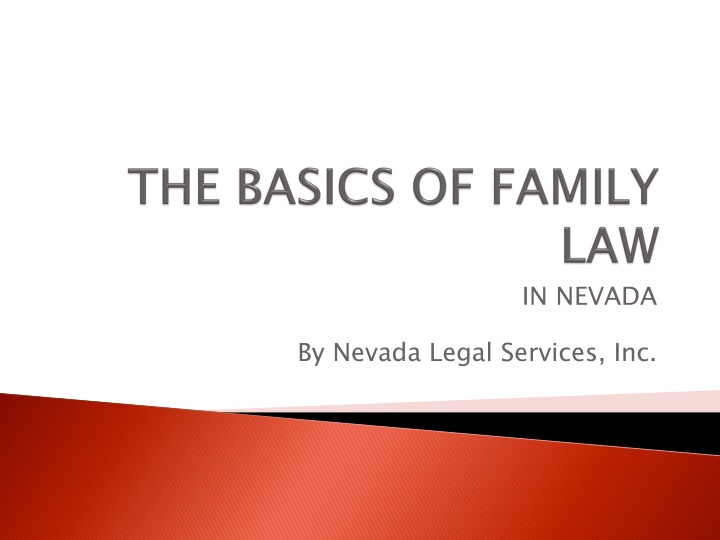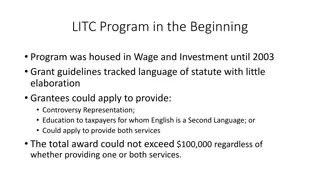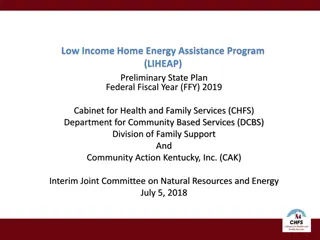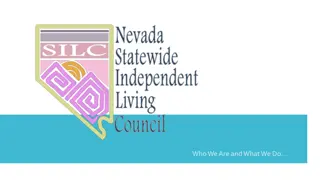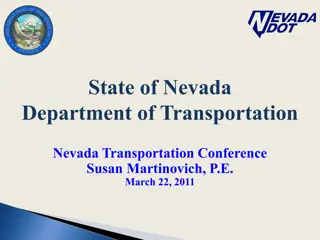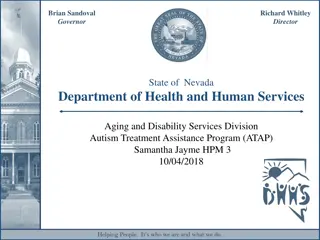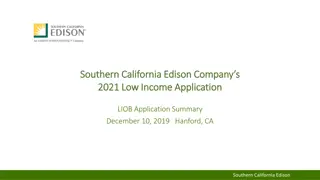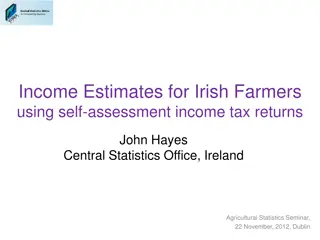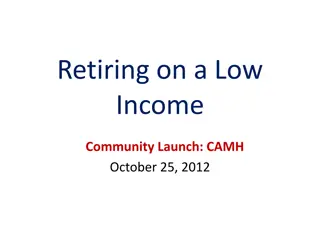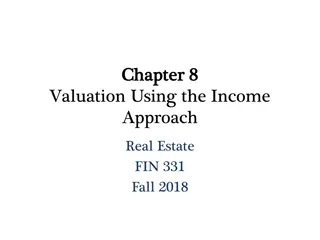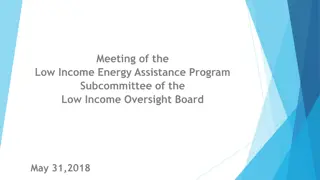Nevada Legal Services: Providing Free Legal Assistance to Low-Income Nevadans
Nevada Legal Services, a non-profit organization, offers free legal services to low-income individuals across Nevada, with offices in Las Vegas, Reno, Elko, Carson City, and Yerington. They assist with various legal matters, including housing, public benefits, family law, and more. Eligibility criteria include being under 200% of the federal poverty level. The organization also provides information on filing for divorce in Nevada, residency requirements, child support, custody, and the state's no-fault divorce laws.
Download Presentation

Please find below an Image/Link to download the presentation.
The content on the website is provided AS IS for your information and personal use only. It may not be sold, licensed, or shared on other websites without obtaining consent from the author.If you encounter any issues during the download, it is possible that the publisher has removed the file from their server.
You are allowed to download the files provided on this website for personal or commercial use, subject to the condition that they are used lawfully. All files are the property of their respective owners.
The content on the website is provided AS IS for your information and personal use only. It may not be sold, licensed, or shared on other websites without obtaining consent from the author.
E N D
Presentation Transcript
IN NEVADA By Nevada Legal Services, Inc.
A non-profit organization providing free legal services to low income Nevadans We are primarily funded through the federal government by the Legal Services Corporation We provide statewide assistance Offices in: Las Vegas, Reno, Elko, Carson City, Yerington Clients must be under 200% of the federal poverty level
Housing Public Benefits Medicaid/Medicare Unemployment Food Stamps TANF Social Security Disability Consumer Law Immigration VAWA U Visa/T Visa Family Law Indian Law Project LITC Senior Law Project (Reno) Pro Bono Name Change Criminal Record Sealing Veteran s Benefits
Living apart does not mean legally separated Couple may seek legal separation (known as separate maintenance Court case will resolve custody orders, support orders, and property and debts will be divided Useful if divorce will affect religion or health insurance separate maintenance) instead of a divorce
Are you eligible to file for divorce in Nevada? One of the people getting divorced must be a Nevada resident Must have lived in Nevada for six weeks or more before filing How about child support or custody? In order to receive a custody or support order the children must have lived in Nevada for six months or more You could get a divorce and then have to go to court in another state to get child support or custody decided
Nevada is a no fault state It s enough to simply say that you re incompatible with your spouse If you can prove it, you can also allege Insanity starting at least two years before the divorce is filed Spouses have lived separate and apart or more than two years Just go with incompatibility. It s easier.
End the marriage Divide up the community property And the community debt Set up child support and custody Award alimony
Joint Petition/Uncontested Divorce Both parties agree on everything Property, Custody, and Child Support Both parties file one action together Faster, less expensive option Contested Divorce Parties do not agree Only one party files Takes longer Will have to go to court at least once
Used when spouses BOTH want to terminate the marriage Both parties must agree on the division of assets in the divorce Both parties must agree on Custody/Child Support Child Support CANNOT be waived; must choose minimum Includes what parties agree on: Division of Property/Debts Spousal Support Custody Child Support
Joint Petition for Divorce Put n/a in questions that don t pertain to you Must be signed Fairly Simple Form Names and addresses Statement that you ve lived in Nevada for six weeks or more Information about children (if applicable) Preferred custody arrangement Child support that should be paid List of community property and debt Whether alimony is agreed upon
Forms needed: Joint Petition for Divorce Both parties need to sign Affidavit of Resident Witness This is a notarized document from someone vouching that they have known you to reside in NV for the required 6 weeks Only one party needs to have a Resident Witness Joint Decree of Divorce Similar to the Petition, this is what the Judge signs Family Court Cover Sheet
Plaintiff Person filing for divorce Defendant Spouse who did not file Plaintiff files Complaint for Divorce Includes what Plaintiff wants for: Division of Property/Debts Spousal Support Custody Child Support
Complaint for Divorce Put n/a in questions that don t pertain to you Must be signed Fairly Simple Form Names and addresses Statement that you ve lived in Nevada for six weeks or more Information about children (if applicable) Preferred custody arrangement Child support that should be paid List of community property and debt Whether Plaintiff wants alimony
Nevada is a community property state What is community property? All assets or debts Acquired during the marriage Community property Belongs to both parties Divided fairly and equally in the divorce What is not community property? Assets or debts incurred by one spouse before the marriage
You may still want to claim all Community Property in your own name for assets or debts you are interested in keeping. For Example: Car Mortgage Especially if you get the most use out the asset.
Money paid from one spouse for the support of the other Case by base basis Factors to consider Ability to pay Spouse s ability to support self Length of the marriage Work history and education Stay-at-home parent Division of other property
Things to remember Can be difficult to obtain Need to bring information to support request Can be difficult to enforce Can get court order to garnish wages (expensive, time consuming) Ex-spouse may have had a change in circumstances. May no longer be working, change of workplace. It s up to you to seek enforcement If you obtain a Default because you cannot find spouse, you will have a difficult time enforcing alimony
Process: Complaint for Divorce and Summons This gives you a case and department number Plaintiff fills out and files Complaint with the Court Clerk Summons is issued by the Court Clerk Plaintiff serves other spouse with Complaint and Summons You have 120 days to serve the Complaint and Summons This must be done in person if at all possible If spouse location is unknown see Service by Publication Affidavit of Service Someone other than Plaintiff has to serve other spouse This form is signed & notarized by server to confirm File this with Court Clerk Service by Publication
If other spouse does not Answer or Counterclaim Plaintiff files Request for Default Choose Summary Disposition or Prove-Up Hearing Summary Disposition no judge Judge reviews and decides based solely on the filed documents. Summary Disposition Form Affidavit of Plaintiff Affidavit of Resident Witness Include proposed Divorce Decree . This MUST mirror the Complaint. Prove-Up Hearing Hearing before judge to clarify any possible issues. File Setting Slip to set court date Affidavit of Resident Witness Include proposed Divorce Decree
The spouse that was served with the Complaint and Summons has 20 days from the date of service to file an Answer or Counterclaim. If other spouse does Answer or Counterclaim This usually means your spouse is opposing something you requested in your Complaint You may file a Reply to the Answer Seek legal assistance with forms
If other party does Answer or Counterclaim Fill out Financial Disclosure Form File and serve within 30 days of Answer/Counterclaim Fill out Family Law Cover Sheet Mandatory Disclosure Must include: 2 years W2, proof of income last 6 months, health/life insurance, expert witnesses Mediation may be required Both parties may want it One party may request it Court may require it
Whether from Joint Petition or Contested Divorce File signed Divorce Decree with Court Clerk Fill out and serve Notice of Entry and a COPY of Divorce Decree to spouse by mail File Certificate of Mailing with the Court Clerk
In a divorce Custody is decided as part of a divorce action Children born during marriage are presumed to be children of the husband If the parties were never married Custody is decided as a separate action, with filing a Complaint
May need to establish who is the father of the child unless: Father is named on Birth Certificate Two parties were married when born 3 Ways to Establish Paternity Voluntary Acknowledgement Both parents sign an Affidavit of Paternity in front of a notary File Complaint to Establish Paternity Which also must establish custody and child support Ask DA to bring an action to establish Paternity Usually court ordered DNA test
Legal Custody Power to make important life decisions Education, health, religion, etc. Joint legal custody is the default Physical Custody Where the child lives Court considers what is in the BEST INTEREST OF THE CHILD
Legal Preseumed Shared Both parents have input 1. Sole: Only one parent Legal Custody Custody Physical Custody Where the child resides 1. Sole: Reside with only one parent 2. Primary: Resides mostly with one parent 3. Joint/shared: Resides with both parents Physical Custody 2. Joint: Both parents Common for both parents to share joint legal custody but one parent have primary physical custody
Fill out Complaint to Establish Paternity/Custody and UCCJEA Declaration When paternity is UNKNOWN Fill out Complaint to Confirm Custody, Visitation, and UCCJEA Declaration When paternity is KNOWN Fill out Summons Fill out Family Law Cover Sheet File with Court Clerk
If you are worried that the other party is going to call the police to attempt to remove the children from your care or leave the state with the child without your permission Fill out and File Preliminary Injunction This lets the police know there is a current legal action regarding the children and they will likely not want to get involved
Serve other party (mother/father) with Complaint, Summons & Joint Preliminary Injunction Must be served within 120 days Requires Personal Service if residing in NV If other party cannot be located use Service by Publication Fill out Affidavit of Service Wait for other party to respond Service by Publication
If other party does not Answer or Counterclaim Plaintiff file Request for Default Choose Summary Disposition or Prove-Up Hearing Summary Disposition no judge Summary Disposition Form Affidavit of Plaintiff Include proposed Custody Order Prove-Up Hearing File Setting Slip to set court date Include proposed Custody Order
Fill out and file Motion to Modify Custody Visitation and/or Child Support Can do this upon substantial change in circumstances OR after 3 years Must be served to the other party by first class mail The Motion gets you a hearing date File Certificate of Mailing with Court Clerk Other part has opportunity to oppose your request Motions Opposition Reply Wait for Decision or Signed Order from Judge
Custodial Parent Has primary or sole custody Non-custodial parent Has visitation rights which allow them to see the child on a pre-arranged basis Decided based on the best interests of the children Be as specific as possible in setting a visitation schedule Less possibility of arguments Easier to enforce Be sure to include Who is responsible for transportation to and from visits Meeting place for parents to pick-up and drop off the child
Be as specific as possible to avoid any problems or confusion. Supervised Visitation Specific Location Specific Time Who qualifies as supervisor Holiday Visitation Schedule How are you splitting holidays? Create a calendar and submit it to the judge for approval When does the holiday begin or end Who is responsible for transportation? Enforcement of Visitation You are responsible for enforcement, although you may ask the police for help enforcing an order
Through a divorce or legal separation settlement Ordered as Part of a Paternity/Custody Action Obtained by a lawsuit brought by the Clark County DA Usually where a parent applies for public benefits Ordered as part of an extended TPO Temporary Protection Order
Theres a formula! NRS 125B.070 Based on gross income i.e. before any other deductions Parent without primary custody pays: 18% of gross income for 1 child 25% of gross income for 2 children 29% of gross income for 3 children 31% of gross income for 4 children 2% for each additional child Minimum $100.00 per child
Neither party can waive child support Enforcement of a child support award is up to the person receiving the money If both parties agree that no child support is needed, must elect the minimum amount but do not have to collect Keep records of all child support exchanges of money and agreements If paying party does not make the regular payment, it is up to you to make the effort to collect or notify department of nonpayment.
Joint physical custody Parent with higher income Pays the percentage (18%-31%) Of the difference in incomes Not the gross income Child support doesn t always follow the formula But a change requires special findings about the needs of the children or burdens on the parents
Joint Physical Custody Parent with the highest Gross Monthly Income (GMI) pays the difference to other parent Parent 1 Parent 1 Parent 2 Parent 2 GMI $3,000 $1,000 1 Child (18% of GMI) $540 $180 Parent 1 $540 Parent 2 -$180 Difference: $360 Paid by Parent 1
Must be reviewed every three years at the request of either parent Change in circumstances A major one, such as a big dip in income When the parties agree But a judge reject this agreement if its not in the best interests of the child
File Motion for Order to Show Cause This sets a court date for parent to show up and explain why they are not paying Be sure to include with the Motion a list of: Every missed payment Amount owed for every missing payment Wage Assignment Notice Letter and copy of support order to employer
File Motion to issue wage attachment Allows court to garnish wages Money sent directly from employer to other parent Can also ask court to Attach other income Attach tax returns Put a lien on property
Need help? Nye County District Attorney Family Support Division May be able to assist with filing for child support May file on your behalf if you are getting public benefits Call (775) 482-8117
